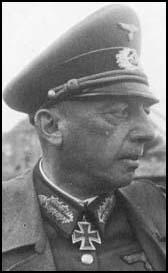Georg von Kuechler

Georg von Kuechler was born in Germany on 30th April, 1881. After attending cadet school he entered the Imperial Army in 1900 and served in the 25th Field Artillery Regiment. Promoted to first lieutenant he spent three years at the War Academy (1910-13) before joining the General Staff in Berlin.
During the First World War he commanded an artillery battery on the Western Front and took part in the major offensives at the Somme and Verdun. In 1916 he became staff officer of the 206th Infantry Division.
In 1919 Kuechler joined the Freikorps and fought the Red Army in Poland. After returning to Germany he joined the staff of the Jueterbog Artillery School. Promoted to colonel, Kuechler became Deputy Commander of the 1st Infantry Division in East Prussia in 1932.
Kuechler succeeded Heinrich von Brauchitsch as commander of Wehrkries I in 1937. The following year he supported Adolf Hitler in his removal of Werner von Blomberg and Werner von Fitsch from power. In March 1939 he joined with Heinrich Himmler in the successful occupation of the Lithuanian port of Memel.
On the outbreak of the Second World War Kuechler was given command of the 3rd Army. During the invasion of Poland Kuechler's troops captured Danzig. Although a committed supporter of the Nazi Party, Kuechler upset the Schutz Staffeinel (SS) by punishing soldiers who committed atrocities against civilians.
In the Western Offensive he fought under General Fedor von Bock and commanded the troops that invaded the Netherlands. He took Moerdijk, Rotterdam and the Hague before moved into Belgium and occupied Antwerp on 18th May, 1940. His attempt to cut off the British Expeditionary Force (BEF) at Dunkirk ended in failure.
During Operation Barbarossa Kuechler led his 18th Army into the Soviet Union. Fighting alongside Ernst Busch and Wilhelm Leeb, Kuechler moved towards Leningrad. In May 1941 General Wilhelm Keitel signed the Commissar Order which instructed German field commanders to execute Communist Party officials immediately they were captured. Kuechler enthusiastically carried out this order and also encouraged his men to kill captured partisans.
On 17th January 1942, Kuechler replaced Wilhelm Leeb as commander of Army Group North. He remained in the Soviet Union until January 1944 when he ordered a withdrawal to the Luga River. Adolf Hitler was furious and replaced Kuechler with General Walther Model.
While in retirement Kuechler was approached by Carl Goerdeler who tried to persuade him to join the July Plot. Although sympathetic to the group's objectives he refused to participate in the attempt to assassinate Hitler.
Kuechler was found guilty of war crimes at Nuremberg and on 27th October 1948 he was sentenced to twenty years' imprisonment for his treatment of partisans in the Soviet Union. Georg von Kuechler, who was released in February 1955, died on 25th May 1968.
